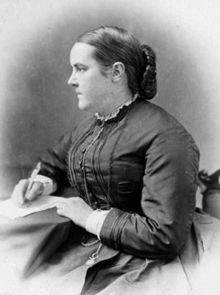Sophia Jex-Blake
Sophia Louisa Jex-Blake (born January 21, 1840 in Hastings , East Sussex , † January 7, 1912 in Rotherfield , Sussex ) was a British doctor , feminist and founder of two medical schools for women, in London and Edinburgh , as well as a woman Hospital.
Life
Sophia Jex-Blake was the youngest daughter of the successful lawyer Thomas Jex-Blake († 1868) and his wife Mary Cubitt († 1881). Sophia was considered precocious and extremely intelligent. Therefore she attended various private schools in the south of England and in 1858 she enrolled at Queen's College, a public college for women in London . During this time, the young woman lived with Octavia Hill , a good friend of the family. A short time later, Sophia was asked to take a position as a tutor in mathematics - her parents only gave their consent after it had been arranged that she taught without any financial support. After Queen's College, Sophia Jex-Blake went to Mannheim and shortly afterwards to the United States . There she attended various schools and wrote the book A Visit to some American Schools and Colleges about it . At the New England Hospital for Women and Children in Boston , she met Lucy Sewell , one of the pioneers of female doctors, and worked there as an assistant for a while. This was a turning point for Jex-Blake: she decided to become a doctor.
In 1867 she applied, along with Susan Dimock , to Harvard University in Cambridge , but was rejected. In the following years, Sophia Jex-Blake studied at the Women's Medical College of the New York Infirmary in New York City , founded by Elizabeth Blackwell , the first American doctor from England . The following year her father died and she returned to England.
Sophia Jex-Blake applied to attend the medical school of Edinburgh University in 1869 . She was initially turned away because it was not appropriate for a single woman to attend the courses. She then organized a group of seven women, including her friend Edith Pechy , who were then allowed to study together. After a year, Sophia Jex-Blake and the other women wanted to attend the anatomy course. On the way to the lecture hall, male students barricaded the entrance, pelted the women with dirt and verbally abused them. When they reached their destination, the women were presented with sheep and explained that "low animals" were no longer excluded from lecture halls.
After she was denied her diploma, Sophia Jex-Blake continued her studies in New York and became a student of Elizabeth Blackwell. A year later, Jex-Blake graduated with a doctorate in medicine (MD, Medical Doctor ). In 1875, Sophia tried in England to have women registered in the medical registry on the basis of the license for obstetrics , whereupon the entire examination board resigned in protest. Sophia Jex-Blake had founded a medical school in Edinburgh at that time, to which she also brought Elizabeth Blackwell, who closed her New York school in 1899. Together with Elizabeth Garrett Anderson , she founded the School of Medicine for Women in London , which later became a medical college, and trained nurses and doctors. After Elizabeth Garrett Anderson retired in 1903 and appointed Isabel Thorne as dean of the medical school , Sophia Jex-Blake left London disappointed and went to Edinburgh . A short time later she retired herself and lived at Tunbridge Wells , where she played an active role in the local Women's Suffrage Society .
Trivia
- Her brother, Thomas William Jex-Blake (1832-1915), was the head of the Rugby School in Rugby , Warwickshire between 1874 and 1887 .
- Her niece, Katharine Jex-Blake , was the head of Girton College from 1916 to 1922 .
- Her other niece, Henrietta Jex-Blake , was from 1909 to 1921 the principal of the girls' collage Lady Margaret Hall in Oxford .
Works (selection)
- 1884 The care of infants: a manual for mothers and nurses
- 1877 Puerperal fever: an inquiry into its nature and treatment: a graduation thesis
- 1876 The practice of medicine by women , together with Edith Pechey and Isabel Thorne
- 1872 Medical women: a thesis and a history
- 1867 A visit to some American schools and colleges
literature
- Melanie Phillips: The Ascent of Woman - A History of the Suffragette Movement and the ideas behind it. Time Warner Book Group, London 2003, ISBN 0-349-11660-1
- Olive Banks: The Biographical Dictionary of British Feminists. Vol. I: 1800-1930. New York 1985
- Josephine Butler : Women's Work and Women's Culture.
- Marilyn Bailey Ogilvie : Women in science: antiquity through the nineteenth century: a biographical dictionary with annotated bibliography . 3. Edition. MIT Press, Cambridge, MA 1991, ISBN 0-262-65038-X , pp. 105-107
Web links
- Sophia Jex-Blake (English)
- Sophia Jex-Blake (English)
| personal data | |
|---|---|
| SURNAME | Jex-Blake, Sophia |
| ALTERNATIVE NAMES | Jex-Blake, Sophia Louisa |
| BRIEF DESCRIPTION | British doctor, feminist and co-founder of the "London School of Medicine for Women" |
| DATE OF BIRTH | January 21, 1840 |
| PLACE OF BIRTH | Hastings , Kent |
| DATE OF DEATH | January 7, 1912 |
| Place of death | Rotherfield , Sussex |


